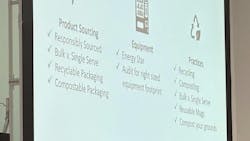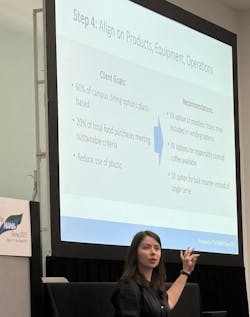Sustainability as a competitive edge: Operators can lead with purpose
Convenience services operators have an opportunity to differentiate themselves through sustainability, said Cassandra Hoover, manager of nutrition and sustainability at Nestlé Professional Solutions, at the NAMA Show on Wednesday.
Millennials and Gen Z are raising the bar on sustainability expectations, and integrating environmentally and socially responsible practices across products, equipment and operations can help operators foster a stronger relationship with their clients. Younger consumers, particularly Millennials and Gen Z, value environmental and social responsibility. Finding tangible ways to integrate sustainability into products, equipment and operations can strengthen relationships with clients who have corporate sustainability and increase client engagement. Operators can help clients meet sustainability KPIs — by offering plant-based meals, recyclable packaging or Energy Star-certified equipment, for instance.
Hoover outlined three areas of opportunity for operators:
- Product: Emphasis on responsibly sourced ingredients, recyclable/compostable packaging, bulk options and local suppliers
- Equipment: Importance of right-sizing, energy-efficient models and features like power-saving modes
- Operations: Waste reduction, composting and recycling. Hoover emphasized that consumer education plays a key role in introducing such initiatives to get employee buy-in.
Hoover cautioned operators to be aware of regional and market variations, noting that sustainability interest is higher in the West and Northeast, and by markets, with colleges, universities, healthcare and some business and industry fields showing the strongest demand for sustainable solutions. Hoover also highlighted greenwashing risks, both in their own service offerings and in the products offered to them to meet sustainability goals. Operators should avoid vague or unverified claims and instead seek out and promote those credible, measurable and backed by third-party certifications such as BPI.
Behavior change is hard, but possible, Hoover noted, and suggested operators work with clients to build strong leadership and employee engagement through education and sometimes incentives.
About the Author
Linda Becker
Editor-in-Chief
Linda Becker is editor-in-chief of Automatic Merchandiser and VendingMarketWatch.com. She has more than 20 years of experience in B2B publishing, writing, editing and producing content for magazines, websites, webinars, podcasts, newsletters and eBooks, primarily for manufacturing and process engineering audiences. Since joining Automatic Merchandiser and VendingMarketWatch.com, Linda has developed a new appreciation for the convenience services industry and the essential role it plays. She is dedicated to serving readers by covering the latest news in the vending, office coffee service and micro market industry. She can be reached at 262-203-9924 or [email protected].


